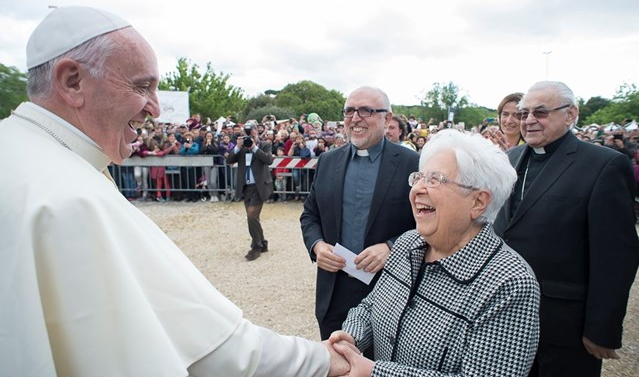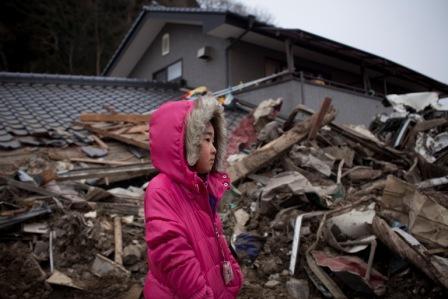
Pope Francis at the Mariapolis
 “It was the first time a Pope came to the Mariapolis and it reminded me of what I had heard Chiara Lubich say several times when describing the effect that the visits and the words of bishops had on her when they visited Mariapolises. She acknowledged them as “an anointing” different and weightier than those of others, whether they were theologians or saints. And she perceived that with the presence of a bishop the ‘city of Mary’ fulfils itself as the ‘city-Church’. This is what happened with the surprise visit of Pope Francis to the Earth Village event at Villa Borghese where, in collaboration with Earth Day Italy, the city of Rome was holding its Mariapolis. Now every Mariapolis in the world – and there are hundreds – will feel looked upon and loved in the same way. His off the cuff remarks seemed to say: you’ve taken me by the heart and I want to respond to what you’ve said to me. His clear and luminous words weren’t only an acknowledgement of the commitment and the deeds of the many people who spoke to him on stage; they also had the flavour of a programme for the future. His words kept returning to the same powerful image of the miracle of being able to transform the desert into forestland. I was struck by the way he acknowledged that what matters is to bring life, not make programmes and remain trapped inside them, but to go out and meet life as you find it, with its disorder and conflicts, without fear, facing the risks and welcoming the opportunities. You have to get close to it if you want to know the reality with your heart. Then the miracles happen: deserts, the most diverse sorts of deserts transform into forestland. Pope Francis possesses the power of the word. The images he uses are not easily erased from the heart or the mind. The Pope repeated several times that we do it together, with different people, groups and associations. He holds us to that and it gives him joy. The human spectacle at Villa Borghese was born from a question: Why not hold the Mariapolis right in the middle of Rome? Why not try to create a graft of fraternity with the city, a small but concrete ‘fraternity graft’ right on the streets of the city? We know that the city weeps because of many wounds and suffers from many weaknesses, but she also lives because of an unbelievable richness: the great good that is being done in her. When the Pope opened the Year of Mercy we thought of the many associations that are doing good in the city. Both religious and non-religious, they perform mercy. The encounter with Earth Day was almost by chance. Earth Day Italy works for the protection of Creation and for that integral ecology that is dear to Francis. It’s a process and exciting work that’s outside the normal scheme, on unimagined roads. Not without its difficulties, certainly, because we didn’t know one another and because we’re all different. But diversity is enriching, as the encounter with more than a hundred associations was. There was cooperation and bridges were built. Sometimes they’re very small things. One new friend told us: “Well, my association goes forward with the help of my pension. We don’t have logos or anything like that.” We wanted the Mariapolis this year to give witness to the good that that friend is also doing. Thus, the many virtuous underground cities contained in Rome emerged. The good is multiplying and a network is spreading that seems to concur with an intuition that Chiara Lubich put into writing in 1949. Encountering and loving Rome ‘many eyes would be illumined with His Light: tangible sign that He reigns there (. . .) reviving Christians and making this age that is so cold because it is atheist the Age of Fire, the Age of God (. . .) He’s not only a religious fact (. . .) And this separating Him from the entire life of men – a practical heresy of our time – subjugates man to something less than himself and relegates God who is Father to somewhere far from His children.”
“It was the first time a Pope came to the Mariapolis and it reminded me of what I had heard Chiara Lubich say several times when describing the effect that the visits and the words of bishops had on her when they visited Mariapolises. She acknowledged them as “an anointing” different and weightier than those of others, whether they were theologians or saints. And she perceived that with the presence of a bishop the ‘city of Mary’ fulfils itself as the ‘city-Church’. This is what happened with the surprise visit of Pope Francis to the Earth Village event at Villa Borghese where, in collaboration with Earth Day Italy, the city of Rome was holding its Mariapolis. Now every Mariapolis in the world – and there are hundreds – will feel looked upon and loved in the same way. His off the cuff remarks seemed to say: you’ve taken me by the heart and I want to respond to what you’ve said to me. His clear and luminous words weren’t only an acknowledgement of the commitment and the deeds of the many people who spoke to him on stage; they also had the flavour of a programme for the future. His words kept returning to the same powerful image of the miracle of being able to transform the desert into forestland. I was struck by the way he acknowledged that what matters is to bring life, not make programmes and remain trapped inside them, but to go out and meet life as you find it, with its disorder and conflicts, without fear, facing the risks and welcoming the opportunities. You have to get close to it if you want to know the reality with your heart. Then the miracles happen: deserts, the most diverse sorts of deserts transform into forestland. Pope Francis possesses the power of the word. The images he uses are not easily erased from the heart or the mind. The Pope repeated several times that we do it together, with different people, groups and associations. He holds us to that and it gives him joy. The human spectacle at Villa Borghese was born from a question: Why not hold the Mariapolis right in the middle of Rome? Why not try to create a graft of fraternity with the city, a small but concrete ‘fraternity graft’ right on the streets of the city? We know that the city weeps because of many wounds and suffers from many weaknesses, but she also lives because of an unbelievable richness: the great good that is being done in her. When the Pope opened the Year of Mercy we thought of the many associations that are doing good in the city. Both religious and non-religious, they perform mercy. The encounter with Earth Day was almost by chance. Earth Day Italy works for the protection of Creation and for that integral ecology that is dear to Francis. It’s a process and exciting work that’s outside the normal scheme, on unimagined roads. Not without its difficulties, certainly, because we didn’t know one another and because we’re all different. But diversity is enriching, as the encounter with more than a hundred associations was. There was cooperation and bridges were built. Sometimes they’re very small things. One new friend told us: “Well, my association goes forward with the help of my pension. We don’t have logos or anything like that.” We wanted the Mariapolis this year to give witness to the good that that friend is also doing. Thus, the many virtuous underground cities contained in Rome emerged. The good is multiplying and a network is spreading that seems to concur with an intuition that Chiara Lubich put into writing in 1949. Encountering and loving Rome ‘many eyes would be illumined with His Light: tangible sign that He reigns there (. . .) reviving Christians and making this age that is so cold because it is atheist the Age of Fire, the Age of God (. . .) He’s not only a religious fact (. . .) And this separating Him from the entire life of men – a practical heresy of our time – subjugates man to something less than himself and relegates God who is Father to somewhere far from His children.”
Maria Voce
President of the Focolare Movement
Source (Italian): Osservatore Romano, 25 aprile 2016 Centro televisivo vaticano (Italian)
Press releases – SIF – Focolare Information Service

